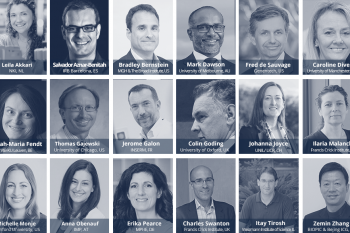To give you a little more insight into the program, here is more information about what some of the THPT20 speakers are currently up to:
Salvador Aznar-Benitah's lab aims at understanding the molecular mechanisms underlying adult stem cell function during homeostasis, ageing and cancer, with special interests in epigenetics, spatiotemporal regulation of stem cells (circadian rhythms), and the link between metastatic-initiating-cells and the content of fat in our diet. He works at IRB Barelona in Spain.
Charles Swanton has helped to define the branched evolutionary histories of solid tumours, processes that drive cancer cellto-cell variation in the form of new cancer mutations or chromosomal instabilities, and the impact of such cancer diversity on effective immune surveillance and clinical outcome. Charles combines his lab research at the Francis Crick Institute with clinical duties at UCLH and as director of the CRUK UCL Lung Cancer Centre in the UK.
Johanna Joyce's laboratory investigates the microenvironment in which a tumour arises and the critical influence that non-cancerous immune and stromal cells can have on tumour progression and metastasis. Johanna is a Full Professor at the University of Lausanne and Full Member of the Ludwig Institute of Cancer Research in Switzerland.
Michelle Monje's research program studies the molecular and cellular mechanisms of postnatal neurodevelopment and pediatric gliomagenesis. This includes micro-environmental influences on neural precursor cell fate choice in normal neurodevelopment and in disease states. Michelle is an Associate Professor of Neurology and, by courtesy, of Neurosurgery, Psychiatry, Pathology and Pediatrics at Stanford University in the US.
Erika Pearce's research focuses on understanding the cellular and molecular mechanisms that control immune responses, with a particular emphasis on how metabolism governs this process. Currently our work is focused on the role of metabolism in regulating memory T cell development and effector T cell function. She is a Director at the Max Planck Institute for Immunobiology and Epigenetics in Freiburg, Germany.
Bradley Bernstein's research focuses on epigenetic gene regulation. His lab studies how gene activity is controlled by noncoding regulatory elements called ‘enhancers’, and by the way the genes are packaged into chromatin. Bradley is a Professor of Pathology and Director of the Epigenomics Program at the Broad Institute. He is a leader of the NIH’s ENCODE project and a founder and advisor for Fulcrum Therapeutics.
